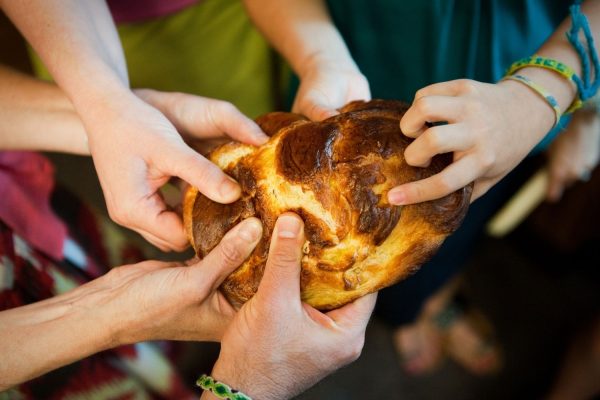When a young person leaves for college, and even before, a transition takes place in the family. The child begins to become an adult; the dependent offspring moves markedly toward independence, as has been going on his or her whole life. The few weeks before taking a son or daughter to college heighten this sense of transition. At this point especially, the status of the son or daughter is ambiguous–child or adult? dependent or independent?
Our liturgy recognizes many transitional moments–the moments between being single and becoming married are marked by the ceremony under the chupah; the moment between Shabbat and the rest of the week is marked by havdalah; the space we cross between inside and outside is marked by a mezuzah. These transitional moments, if used well, can help to take us from one status to another.
Tom F. Driver in The Magic of Ritual1makes the observation:
One obvious aspect of ritual is that it not only brings people together in physical assembly but also tends to unite them emotionally….This aspect of our subject must be approached by drawing attention to what anthropologists have come to call “liminality.” (Driver, 152)
Driver explains the term liminality, based upon Arnold Van Gennep in Rites of Passage,2 as being a type of ritual “that effect[s] a passage from one social situation to another–from childhood to adulthood…” According to Van Gennep, these rituals are “transitional rites, rites of threshold… in which the persons in passage were neither in their previous state, from which they had been separated, nor yet in that subsequent, reincorporated state to which the rites were conducting them, but rather were between two conditions, neither here nor there.” Obviously, the young student about to leave home but not yet in college is one of these people in an in-between state. Van Gennep describes this state as “flanked on the one side by preliminal (the separating) rites, and on the other by postliminal (the reincorporating) rites.”
The rituals described below, a havdalah ceremony and a chanukat ha’cheder ceremony, have as their raisons d’etre to bring order and to unite the family emotionally during a time of transition, a time of “liminality.” Here, the pre-liminal rite is the havdalah ceremony, acknowledging the separation that is about to begin. The chanukat ha’cheder ceremony is the post-liminal rite on the other side, incorporating the student into his/her new room and community.
For Van Gennep, according to Driver, “Rites of passage conducted persons through a nothingness, a temporary loss of identity in a time that was no time and a place that was nowhere.” Certainly this is an apt description of a young adult about to go off to college, whose home is not exactly his or her parents’ house anymore, but who has not yet made the journey to a campus residence.
The two ceremonies below can be used to help mark this time for the parents, siblings, and the new college student. Intentionally, one ceremony takes place in the home of adolescence, and one in the new home of growing adulthood. The ritual can help to put some closure on the student’s attachment to one place and define his or her new space, within both the family and Judaism. As the ceremony of havdalah separates between Shabbat and the everyday, this ceremony has the added dimension of separating between the child’s current life and the new one. The nailing of the mezuzah can symbolize the student “nailing down” new roots in a new place.
HAVDALAH – SEPARATION
To be done at the end of the Sabbath prior to the student’s departure from the home (alternative: A night or two before without the traditional havdalah liturgy.)
- Use a new havdalah candle for this ceremony, to be given afterwards to the student to take to college. Look for an unusual one, or make one. (For both do-it-yourself kits and ready-made candles, try Shendl’s Candles, P.O. Box 21095, Oakland, CA 94620.)
- Be’samim (spices) can be a mix of kitchen spices or potpourri in a jar, or an orange with cloves.
- For additional ideas, consult “On Leaving Home: A New Rite of Passage” by Steven Stroiman in The Second Jewish Catalog, eds. Sharon Strassfeld and Michael Strassfeld, Jewish Publication Society, Philadelphia, 1976.
Parent:
Havdalah marks the transition from Shabbat to the everyday, and we hereby recognize the transition of ____________ from being our child to being a young adult. from dependence to independence from this home to the next.
Like Adonai tzva’ot, the God of Hosts, who came to Jacob in dreams when he left his parents’ home to find a new life for himself may Elohei Ya’akov, the God of Jacob, be with you as you find your new life.
Student or sibling:
Recites Havdalah
Parent:
When Jacob sent Joseph to see his brothers in Shechem, he had no idea of the path Joseph would travel before they would see each other again. From a pit and slavery he eventually became second only to Pharaoh, saving Egypt from famine. We know as we send you out, leaving the safety and comfort of this home, that your journey will be full of challenges as well as success. And when we see you again, we will probably weep with relief and joy like Jacob did.
As you leave to go to school, we know you will return a different person, having grown and experienced new things. As we send you out, like Jacob sent out Joseph, we look forward to seeing on your return the changed you, stronger and wiser.
(This is a good time for parents, siblings, and student to share personal thoughts or poetry with each other.)
HANUKAT HA’CHEDER – CONSECRATING THE NEW ROOM; AFFIXING THE MEZUZAH
- This ceremony requires a mezuzah (case and kosher klaf or parchment), hammer and nails. (Check with the residence hall to find out if nails are allowed. If not, use poster tape or other semi-permanent adhesive.)
- Consider making a mezuzah out of clay or Sculpee.
- For further information about mezuzah, consult The Jewish Home: A Guide for Jewish Living by Daniel B. Syme, UAHC Press, New York, 1988.
Parent:
In our home, Judaism is an important, living, breathing part of our lives. We want the same to be true for you in your new home.
Son/daughter or sibling:
Recites Ve’ahavtah
Parent:
We are commanded to put mezuzot on our doorposts as a reminder to love God and follow God’s commandments In the same paragraph we are commanded to teach this to our children as well. We give you this mezuza and teach you how to put it up yourself so that you may fulfill the mitzva of affixing a mezuzah, and we may fulfill the mitzvah of teaching you.
Barukh attah Adonai eloheinu melekh ha-olam asher kidshanu be’mitzvotav ve’tzivanu likboa mezuzah.
Brukhah at Ya eloheinu ruach ha-olam asher kidshatnu be’mitzvoteiha ve’tzivatnu likboa mezuzah.
Blessed are You, Adonai our God, Ruler of the universe, who has made us holy with God’s mitzvot and commanded us to affix the mezuzah.
Barukh attah Adonai eloheinu melekh ha-olam shehecheyanu ve’kiymanu ve’higianu lazman hazeh.
Bruhkah at Ya eloheinu ruach ha-olam shehecheyatnu ve’kiymatnu ve’higiatnu lazman hazeh.
Blessed are You, Adonai our God, Ruler of the universe, who has kept us alive, sustained us, and helped us to reach this moment.
Affix mezuzah.
(This is an opportunity for members of the family to share thoughts with one another)
Psalms 20:2-3, 5-6 (Jewish Publication Society translation)
Parents:
May the Lord answer you in time of trouble, the name of Jacob’s God keep you safe.
May He send you help from the sanctuary, and sustain you from Zion.
May He grant you your desire, and fulfill your every plan.
May we shout for joy in your victory, arrayed by standards in the name of our God.
May the Lord fulfill your every wish.
————————-










